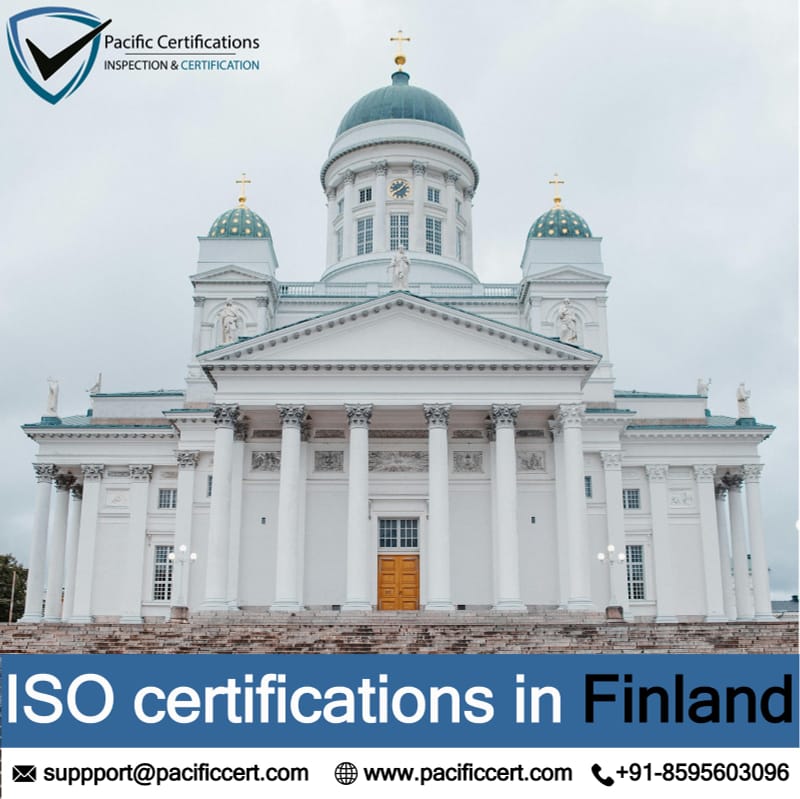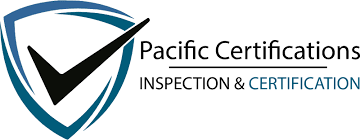ISO Certifications in Finland, Popular Standards, Requirements and Benefits

Introduction
Finland, known for its high standards of quality, innovation, and efficiency, recognizes the importance of ISO certifications across various sectors. ISO certifications provide a framework for consistent quality, environmental responsibility, safety, and efficiency, helping businesses to enhance their operations and meet international standards. We at Pacific Certifications assist companies in Finland with the audit and certification process, ensuring they meet the necessary ISO standards
Key ISO standards relevant to businesses in Finland
ISO 9001: Quality Management Systems:
Enhances customer satisfaction through effective quality management systems.
ISO 14001: Environmental Management Systems:
Focuses on reducing environmental impact and ensuring sustainable practices
ISO 45001: Occupational Health and Safety Management Systems:
Ensures workplace safety and health management.
ISO 27001: Information Security Management Systems:
Manages the security of information assets.
ISO 50001: Energy Management Systems:
Focuses on improving energy performance and efficiency.
ISO 22000: Food Safety Management Systems:
Ensures food safety from production to consumption.
Click here to find out more applicable standards to your industry
How Pacific Certification can help?
We specialize in auditing and certifying management systems to ensure they meet ISO standards. Here’s how we can support businesses in Finland:
Initial Assessment
- We conduct a thorough initial assessment to understand your organization’s current management systems and identify areas for improvement.
Gap Analysis
- We perform a gap analysis to determine what is needed to meet the specific ISO standards relevant to your industry.
Certification Audit
- Our team of experienced auditors will carry out the certification audit, assessing your management systems against the ISO standards
- We provide detailed audit reports highlighting strengths and areas for improvement
Issuance of Certification
- Upon successful completion of the audit, we issue the ISO certification, demonstrating your commitment to quality, safety, environmental responsibility, or other relevant areas.
Surveillance Audits
- To ensure ongoing compliance, we conduct regular surveillance audits, helping you maintain and continuously improve your management systems
For businesses in Finland looking to achieve ISO certification, we are here to help with the audit and certification process. Contact us today at [email protected] to learn more about how we can assist you in meeting your ISO certification needs!
Requirements of ISO Certifications in Finland
The process of obtaining ISO certifications in Finland, involves a systematic approach to building and maintaining a management system that complies with the specific ISO standard sought. Below are the general requirements:
Understanding the Standard:
The first step is to understand the requirements of the specific ISO standard. This means understanding the principles of quality management, including customer focus, leadership, engagement of people, process approach, improvement, evidence-based decision making, and relationship management.
Gap Analysis:
Conducting a gap analysis to determine how existing processes align with the ISO requirements. This helps identify areas that need adjustments or new processes that need to be developed.
Management Commitment:
Top management must be involved and committed to the implementation of the management system. Their leadership and support are crucial for the system to be effective and for the certification process to succeed.
Documentation:
Developing documentation that complies with the ISO standards. This includes the quality policy, quality objectives, quality manual, procedures, work instructions, and records. Documentation should be clear, concise, and accessible to relevant personnel.
Implementation:
Implementing the system throughout the organization. This means ensuring that the documented processes are being followed and integrated into daily operations.
Training and Competence:
Employees must be trained to competently perform their duties within the framework of the ISO standard. Ongoing training is essential to maintain compliance and to ensure continuous improvement.
Performance Evaluation:
Establishing methods for monitoring and measuring the effectiveness of the system. This includes regular internal audits and management reviews.
Continuous Improvement:
ISO standards require continuous improvement of the management system. This involves using data and feedback to make informed decisions about changes and improvements.
External Audit:
Hiring an accredited certification body to conduct an external audit. The certification body will assess the compliance of your management system with the ISO standard.
Certification and Surveillance:
Once certified, the organization will need to undergo regular surveillance audits to ensure ongoing compliance with the standard.
How Finnish Regulations Intersect with ISO Requirements?
While the ISO standards are international and apply broadly, local Finnish regulations and practices can influence how they are implemented. For instance:
Environmental Regulations:
For ISO 14001 certifications, Finnish environmental laws and regulations will dictate specific practices and benchmarks for environmental management
Data Protection Laws:
For ISO 27001, Finland's adherence to the EU's GDPR means that information security management must align with strict data protection regulations
Occupational Health and Safety:
ISO 45001 implementations must consider local Finnish occupational health and safety laws to ensure that the management system is compliant both with ISO standards and Finnish legal requirements
By addressing these requirements systematically and ensuring alignment with both ISO standards and Finnish regulations, organizations can successfully obtain and maintain ISO certifications, enhancing their operational effectiveness and market credibility in Finland and internationally.
Benefits of ISO Certifications in Finland
ISO certifications are particularly valuable in a country like Finland where high standards of quality, sustainability, and security are expected by consumers, businesses, and regulatory bodies alike. Here are some key benefits of obtaining ISO certifications for organizations operating in Finland:
Enhanced Quality and Efficiency
- Streamlined Processes: ISO certifications often require organizations to identify, document, and optimize their core processes. This leads to more efficient resource use and often reduces waste and downtime.
- Consistent Quality: Adherence to ISO standards ensures that products and services are consistently delivered to meet customer requirements, thereby reducing the error rate and increasing customer satisfaction.
Increased Credibility and International Recognition
- Market Trust: ISO certifications are internationally recognized marks of quality. Having these certifications demonstrates a commitment to quality standards and best practices, which can significantly boost an organization's reputation both domestically and internationally.
- Competitive Advantage: In tender processes, especially where public contracts are concerned, ISO certifications can be a prerequisite. They give certified companies a competitive edge over non-certified counterparts.
Improved Customer Satisfaction
- Meet Customer Expectations: ISO standards often focus on enhancing customer satisfaction by prompting organizations to work closely with their clients to understand their needs and deliver products and services that meet those needs effectively.
- Feedback and Improvement: ISO standards also require organizations to seek and act on customer feedback, which helps in improving the quality of offerings and enhancing customer service.
Regulatory Compliance
- Ease of Compliance: Many ISO standards align with regulatory and legal requirements. For example, ISO 14001 helps companies in environmental management, including compliance with environmental regulations. Adhering to ISO standards can make it easier for companies to comply with local and international laws and regulations.
- Reduced Legal Risks: By enhancing compliance and record-keeping procedures, ISO certifications can help reduce the risk associated with non-compliance of legal requirements.
Environmental Impact
- Sustainable Practices: For organizations in Finland, particularly those with environmental impact, ISO 14001 can help in implementing sustainable practices that reduce environmental footprints, manage waste, and improve resource efficiency.
- Corporate Responsibility: These practices strengthen corporate social responsibility (CSR) initiatives, aligning the business with societal values that prioritize environmental conservation and sustainability.
Employee Safety and Engagement
- Safer Workplace: ISO 45001, which focuses on occupational health and safety, helps create safer work environments. This reduces the risk of accidents, aids compliance with health and safety laws, and improves overall employee well-being.
- Employee Engagement: Implementing ISO standards involves training and engaging with employees to follow and improve processes. This can increase employee involvement and satisfaction.
Risk Management
- Better Risk Management: Many ISO standards incorporate risk management into their core principles. Organizations are encouraged to identify potential risks in their processes and implement preventative measures to mitigate them, thereby enhancing resilience and stability.
Innovation and Continuous Improvement
- Encourages Innovation: The continuous improvement aspect of ISO standards encourages organizations to seek innovative ways to improve their processes and outputs. This can lead to new product developments and improvements in service delivery.
- Ongoing Improvement: Regular audits required for maintaining ISO certification ensure that companies do not become complacent, fostering a culture of continuous improvement.
For Finnish companies, ISO certifications not only open up international markets but also ensure they maintain the high standards of quality and efficiency expected within Finland, supporting their long-term sustainability and growth
Which industries need ISO Certifications in Finland?
In Finland, ISO certifications are widely regarded across various sectors as a demonstration of operational excellence and commitment to international standards. Here are some of the key industries in Finland where ISO certifications are particularly relevant:
Manufacturing
- ISO 9001 (Quality Management Systems): Helps manufacturers ensure consistent quality and meet customer requirements.
- ISO 14001 (Environmental Management Systems): Important for reducing environmental impact and meeting stringent European environmental regulations.
Information Technology and Telecommunications
- ISO/IEC 27001 (Information Security Management Systems): Critical for protecting data and managing IT security risks, especially given Finland’s strong IT sector.
- ISO 22301 (Business Continuity Management): Ensures IT companies can maintain critical functions in the event of disruptions.
Healthcare and Pharmaceuticals
- ISO 13485 (Medical Devices): Essential for manufacturers and suppliers of medical devices, ensuring product safety and quality.
- ISO 9001: Helps healthcare providers streamline their processes and enhance patient care quality.
Construction and Engineering
- ISO 9001: Assures quality in project delivery, from design through to construction.
- ISO 45001 (Occupational Health and Safety Management Systems): Ensures worker safety in an industry that is prone to high risks of occupational injuries.
Food and Beverage
- ISO 22000 (Food Safety Management): Helps businesses in the food chain manage and mitigate food safety risks.
- ISO 14001: Important for managing environmental impact in production and processing.
Energy and Utilities
- ISO 50001 (Energy Management Systems): Helps organizations in this sector improve their energy performance, crucial in a country that values sustainable energy practices.
- ISO 14001: Ensures environmental compliance, a significant consideration in energy production, particularly with Finland’s focus on reducing environmental footprints.
Education and Research Institutions
- ISO 9001: Can improve the quality of educational services and administrative processes.
- ISO/IEC 27001: Protects sensitive data and research information, which is especially pertinent in higher education and research facilities.
Transport and Logistics
- ISO 9001: Enhances service quality and customer satisfaction in a competitive market.
- ISO 45001: Critical for ensuring the safety of employees in a sector that involves significant risks related to transportation and warehousing.
Tourism and Hospitality
- ISO 9001: Helps hotels, tour operators, and other service providers in the tourism industry enhance service quality and customer satisfaction.
- ISO 14001: Supports sustainable tourism practices, important in Finland’s pristine natural environments.
These certifications are tools that can help businesses not only meet regulatory requirements and improve processes but also build a competitive edge in the global market. For industries that are heavily regulated or highly competitive, obtaining ISO certifications can be particularly beneficial.
Contact Us
Pacific Certifications is accredited by ABIS, in case you need support with ISO certification for your business in Finland, please contact us at [email protected] or +91-8595603096.
Ready to get ISO certified?
Contact Pacific Certifications to begin your certification journey today!
Suggested Certifications –
Read more: Pacific Blogs

